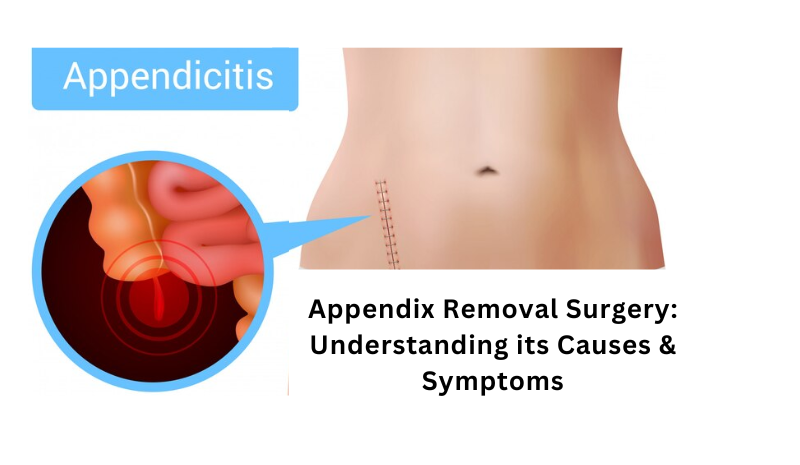Appendicectomy aka Appendectomy is the surgical removal of the appendix because of the medical condition Appendicitis. When your appendix is infected or is injured, your body will produce a response (i.e. inflammation).
While it can be a sudden and painful experience, understanding the causes, symptoms, and treatment can help you recognize the condition and seek timely medical care.
Causes of Appendicitis
Appendicitis is primarily caused by a blockage in the appendix, a small, finger-shaped pouch that extends from the large intestine. This blockage can be caused by:- Fecal matter: Hardened stool can obstruct the appendix's opening.
- Foreign objects: Rarely, small objects can become lodged in the appendix.
- Infection: Inflammation in the digestive system can lead to swelling of the appendix.
- Tumors: Less commonly, growths within the appendix can cause a blockage.
Symptoms of Appendicitis
Recognizing the symptoms of appendicitis is necessary for timely treatment. While symptoms can vary, common indicators include:- Belly pain: This is often the first and most noticeable symptom. The pain usually starts around the navel and then moves to the lower right abdomen.
- Loss of appetite: As the inflammation worsens, you may lose interest in food.
- Nausea and vomiting: These symptoms often accompany abdominal pain.
- Low-grade fever: A mild fever may develop as the infection progresses.
- Tenderness in the lower right abdomen: The area may be sensitive to touch. It's important to note that these symptoms can also be associated with other conditions, so it's essential to consult a healthcare professional for a proper diagnosis.
- Prevention of rupture: If left untreated, the appendix can rupture, leading to a potentially life-threatening infection called peritonitis.
- Relief from pain: Removing the inflamed appendix eliminates the source of pain and discomfort.
- Improved overall health: By preventing complications, appendectomy contributes to overall well-being.
- Open appendectomy: This involves a larger incision in the lower right abdomen to access and remove the appendix.
- Laparoscopic appendectomy: This minimally invasive surgical procedure uses small cuts (incisions) and a laparoscope (a thin, lighted tube with a camera) to visualize and remove the appendix.
- Pain at the incision site
- Nausea and vomiting
- Fatigue
- Constipation or diarrhoea
- These symptoms usually subside within a few days. However, if you experience severe or persistent pain, fever, or other concerning symptoms, it's important to contact your doctor.
Benefits of Appendectomy
While the appendix itself is not considered essential for survival, removing it becomes necessary to prevent serious complications. The benefits of appendectomy include: ·How Common is Appendix Removal?
Appendectomy is one of the most common emergency surgeries performed. While the exact statistics vary, it's estimated that around 9% to 10% of the population will experience appendicitis at some point in their lives. The most common age range for appendicitis falls under 10 to 20 years.Appendix Removal Reasons
The primary reason for an appendectomy is appendicitis. This occurs when the appendix becomes inflamed and infected, often due to a blockage. Other less common reasons for removing the appendix might include cancer or diverticulitis. However, in most cases, the appendix is removed due to appendicitis.Appendix Removal Surgery Procedure
There are two main types of appendectomy:How Long Does Appendix Removal Surgery Take?
The duration of an appendectomy varies depending on several factors, including the type of surgery performed and any complications encountered. Generally, a laparoscopic appendectomy tends to be shorter than an open surgical procedure. On average, the surgery can last up to an hour. However, preparation and recovery time should also be considered.Recovery Time After Appendix Removal
Recovery time after an appendectomy depends on the type of surgery performed and the individual's overall health. Laparoscopic surgery typically allows for a quicker recovery compared to open surgery. Most patients can resume normal activities within a few weeks, but following your doctor's recommendations is essential.After Surgery Effects
Common after-effects of an appendectomy include:Can Appendix Removal Cause Bowel Problems?
While rare, it's possible to experience bowel problems after an appendectomy. These issues can include constipation, diarrhea, or changes in bowel habits. Most of the time, these problems are temporary and resolve on their own. However, if you have persistent or severe bowel issues, consult your doctor. In most cases, appendectomy is a safe and effective procedure with minimal long-term health consequences. However, as with any surgery, there is a risk of complications, such as infection, bleeding, or injury to nearby organs. These complications are relatively uncommon but should be discussed with your doctor before the procedure.Can Appendix Removal Surgery Affect Fertility?
The appendix is not involved in reproductive function. Also, there is no scientific evidence to suggest that appendectomy causes infertility in either men or women.Conclusion:
If you experience symptoms of appendicitis, such as abdominal pain, nausea, vomiting, or fever, it is time you seek medical attention promptly. Early diagnosis and treatment can prevent complications.KM NU Hospitals is a multispecialty hospital situated in Ambur. Our hospital has many facilities to carry out an appendectomy and Laparoscopic Appendectomy. To avail the best appendix removal surgical treatment in Ambur, visit our experts at KM NU Hospitals today!
References:
NCBI: https://www.ncbi.nlm.nih.gov/books/nbk580514/
NHS UK: https://www.nhs.uk/conditions/appendicitis/treatment/
